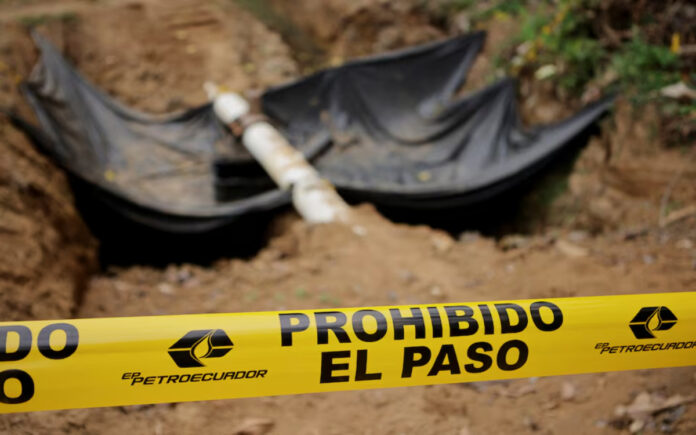Quito: Organized crime groups in Ecuador are targeting the state-run oil company Petroecuador, stealing fuel to support drug trafficking operations and perpetrating violent attacks on oil fields. These activities have resulted in over $215 million in losses from 2022 through October 2024, according to Petroecuador and officials.
Criminals have tapped pipelines to steal gasoline, diesel, and other fuels, which are used to manufacture cocaine and transport drugs. Violence has also escalated, with thieves attacking oil workers, extorting employees, and stealing copper wiring, further disrupting operations.
Escalating Fuel Theft
Illegal taps on state-controlled pipelines have surged, from 32 incidents in 2022 to 773 by October 2024. During a recent visit, Reuters reported at least nine illegal taps within a 25-meter section of the Esmeraldas-Santo Domingo pipeline. These taps alone have caused $17 million in losses this year.
Petroecuador technicians face significant challenges removing these illegal valves, which often result in spills or necessitate halting fuel pumping. Some pipelines, such as the Santo Domingo-Pascuales jet fuel line, have been completely shut down due to extensive tapping.
Drug Trafficking Link
Stolen fuel is integral to drug production and transport operations. According to police, it is used to manufacture precursor chemicals for cocaine in neighboring Colombia and to fuel high-speed boats that smuggle drugs northward.
Lieutenant Colonel Hugo Amores, head of the hydrocarbons crimes unit, emphasized the need for judicial reform, stating, “Without forceful laws, the efforts of police and military are ineffective.” Fuel theft sentences currently range from two months to five years, while organized crime charges can carry up to 10 years in prison.

Violence Against Workers
Beyond theft, criminals are extorting oil workers, particularly in provinces like Esmeraldas, where Ecuador’s largest refinery is located. Jipson Martinez, head of Petroecuador’s union, estimated that 25% to 30% of workers in Esmeraldas face extortion demands. Martinez himself was forced to relocate after refusing to pay, leading to an attempted bombing of his home.
Government Measures
President Daniel Noboa’s administration has deployed military patrols and drones to monitor fuel pipelines and bolster security at oil installations. Petroecuador is exploring advanced technologies to detect illegal taps more effectively and has proposed establishing a joint command center with police to respond to theft incidents faster.
However, security analyst Renato Rivera cautioned that current efforts focus on immediate arrests rather than dismantling the broader criminal networks driving the thefts.
Also Read | South Korea’s Political Crisis Deepens as Yoon Vows to ‘Fight to the End’
Broader Impact
Thefts of copper wiring, unrelated to drug production, have caused $4 million in losses this year, contributing to a 1% dip in oil output over nine months. In November, the military discovered an illegal refinery in Sucumbios capable of producing 10,000 gallons of gasoline per week for drug production.
Despite increased security measures, crime continues to rise. Amores described the situation as a “revolving door,” with criminals often released shortly after arrest.
Also Read | Israeli Airstrike on Gaza Post Office Kills 66, Including Displaced Families
Significant Challenges
Fuel theft and violence pose significant challenges to Ecuador’s oil industry, undermining its economic stability and fueling criminal enterprises. Addressing these issues requires comprehensive measures, including enhanced security, judicial reforms, and targeted action against criminal networks.



